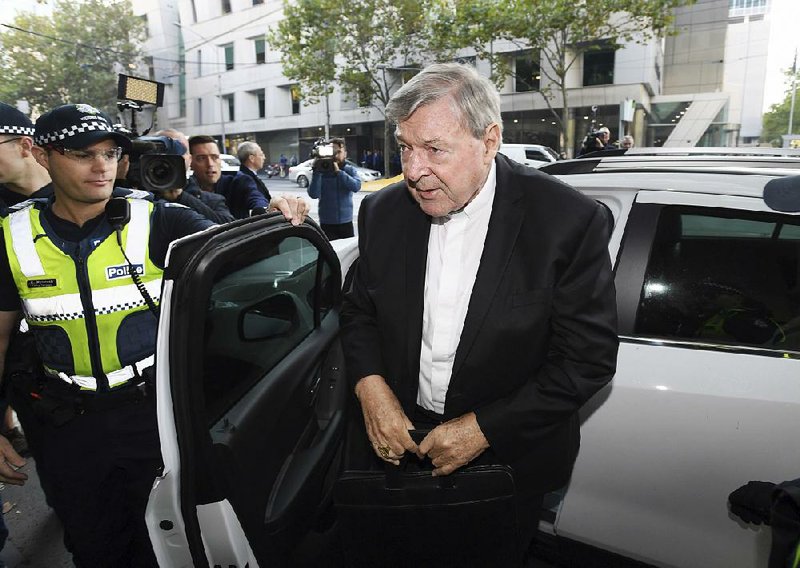MELBOURNE, Australia -- Australian Cardinal George Pell, the most senior Vatican official to be charged in the Catholic Church sex-abuse crisis, will face two trials within months on sex-crime allegations spanning decades, a court was told today.
Pell appeared for an administrative first hearing in the Victoria state County Court where he will be tried a day after a magistrate decided he should face a jury but dismissed about half the charges the cleric had faced during a preliminary hearing in a lower court.
His lawyer Robert Richter said today that he had agreed with prosecutors to split the remaining charges into two trials.
The charges relating to Pell's time as a priest in his hometown of Ballarat in the 1970s and those relating to his time as archbishop of Melbourne in the 1990s were "of a completely different nature" and "separated by 20 years," Richter told Judge Sue Pullen.
Details of the charges and their number have not been made public.
Pell also wanted the first trial to start soon for several reasons, Richter said.
"No. 1, my client is 76 years old and No. 2, everyone has to get on with their lives," Richter said.
Richter also noted that one of the witnesses was 80 years old.
Pell has taken leave from his Vatican job as Pope Francis' finance minister and plans to return to it once he is acquitted.
Prosecutor Mark Gibson anticipated the prosecution would need three months to compile its case, but later described that estimate as "conservative," meaning prosecutors could be ready sooner.
Pullen said: "I do think three months is a little excessive."
Prosecution and defense lawyers agreed the two separate trials would take a total of between eight and 10 weeks.
Asked by Pullen if Pell could afford his defense, Richter replied the cardinal had "no problem with funding."
Pell was allowed to leave the court on bail ahead of his next administrative hearing May 16. Pullen rejected an application to excuse Pell from attending that day.
Dozens of police linked arms to escort Pell, wearing a dark suit, white shirt and a cleric's collar, through a media throng from the court to a waiting car.
Lawyers for Australia's highest-ranking Catholic have been fighting the allegations since before he was charged in Rome by summons in June.
When Magistrate Belinda Wallington asked Pell on Tuesday how he pleaded, the cardinal said in a firm voice, "Not guilty." Wallington gave the cardinal permission not to stand as is customary.
It was the first time after numerous court appearances that Pell had been required to enter a plea. When the magistrate left the room at the end of that hearing, many people in the packed public gallery broke into applause.
Anne Barrett Doyle, of BishopAccountability.org, a Massachusetts-based online abuse resource, described the magistrate's decision to make Pell stand trial as "a turning point in the global abuse crisis in the Catholic Church."
"Whatever its outcome, the judge's decision marks the victory of accountability over impunity, and of the rule of secular law over the Vatican's failed strategy of cover-up," she said.
After Pell was ordered to stand trial,Vatican spokesman Greg Burke issued statement saying: "The Holy See has taken note of the decision issued by judicial authorities in Australia regarding His Eminence Cardinal George Pell. Last year, the Holy Father granted Cardinal Pell a leave of absence so he could defend himself from the accusations. The leave of absence is still in place."
Pell's plea marked the only words he spoke in public during the Tuesday hearing. He was silent as he entered and left the downtown courthouse with Richter. More than 40 police officers maintained order on the crowded sidewalk outside.
The cardinal's legal team found some solace in the outcome, with Richter telling the magistrate that "the most vile of the allegations" had been dismissed.
Under his bail conditions, Pell cannot leave Australia, contact prosecution witnesses and must give police a 24-hour notice of any change of address.
Since Pell returned to Australia from the Vatican in July, he has lived in Sydney and flown to Melbourne for his court hearings. His circumstances are far removed from the years he spent as the high-profile and polarizing archbishop of Melbourne and later Sydney before his promotion to Rome in 2014.
For Francis, the accusations against Pell are a threat to the pope's credibility, given that he promised a "zero tolerance" policy for sex abuse in the church.
Advocates for abuse victims have long railed against Francis' decision to appoint Pell to the high-ranking position in the first place. At the time of his promotion, Pell was already facing allegations that he had mishandled cases of clergy abuse during his time leading the church in Melbourne and Sydney, Australia's largest cities.
So far, Francis has withheld judgment of Pell, saying he wants to wait for justice to run its course. And he did not force the cardinal to resign, though Pell took an immediate leave of absence so he could return to Australia to fight the charges. Pell said he intends to continue his work as a prefect of the church's economy ministry once the case is resolved.
A Section on 05/02/2018

